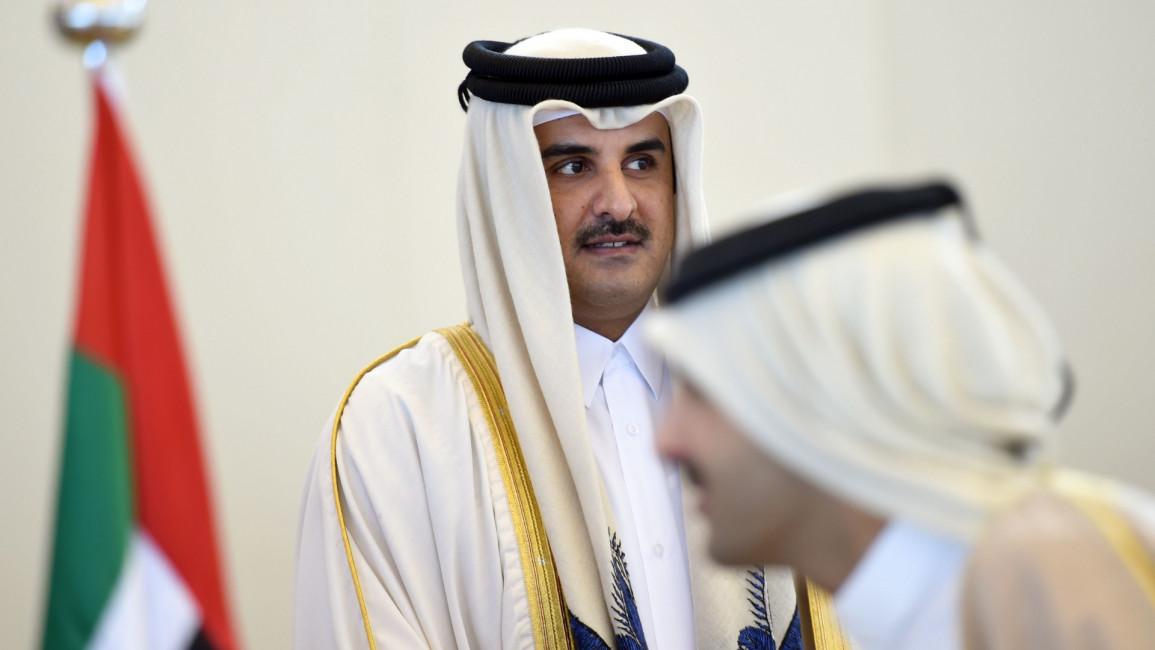Follow us on Facebook, Twitter and Instagram to stay connected
US reproaches UAE, allies for failing to 'normalise' with Qatar while extending bridges to Israel
US reproaches UAE, allies for failing to 'normalise' with Qatar while extending bridges to Israel
US Deputy Assistant Secretary for Arabian Gulf Affairs Timothy Lenderking urged Saudi Arabia, the UAE and Bahrain to end their blockade on Qatar.
3 min read
Qatar's Emir Sheikh Tamim bin Hamad al-Thani [Getty]
The United States has urged Gulf countries that have normalised relations with regional foe Israel to move to end their "unfortunate" blockade on neighbouring Qatar.
In a special briefing, Deputy Assistant Secretary for Arabian Gulf Affairs Timothy Lenderking told an audience: "If it’s possible for countries to normalise with Israel, it ought to be possible for Arab countries to normalise amongst each other."
He went on to say that he wants the Abraham Accords to be used as a "springboard to generate momentum to break down…the Gulf conflict".
His remarks come after Bahrain joined the UAE in a decision to normalise relations with Israel. On September 15 the White House hosted the so-called Abraham Accords signing ceremony, where leaders of UAE, Bahrain and Israel formalised relations in a controversial move.
The decision to formalise ties was met with condemnation from Palestinian leaders and activists who criticised the move, and a petition against it garnered over a million signatures in a day.
Qatar refused to normalise relations with Israel until the Palestinian issue is resolved.
For many in the Middle East, the deal with Israel marks a devastating shift in a decades-old status quo where Arab countries have tried to maintain unity against Israel over its treatment of Palestinians under its multi-generational occupation.
The US says it has been pushing to end the quartet blockade - made up of Saudi Arabia, Bahrain, the UAE and Egypt – against Qatar, which was imposed since 5 June 2017. But Washington insists it cannot impose a solution.
"We’re not going to be able to impose a solution," Lenderking said.
"We need the countries...involved in the rift, the quartet plus Qatar, to make some compromises and particularly to work together.
"And we’ve appreciated Kuwait’s mediation; it’s still very active and we are very grateful for that, for the role that Kuwait has played. But ultimately, these countries are going to have to come together and talk and resolve the differences."
Qatar hosts historic intra-Afghan talks
Lenderking’s comments come on the heels of historic talks between the Afghanistan government and the Taliban, and the US-Qatari Strategic Dialogue, both hosted by Doha.
"Contrary to previous years, the strategic dialogue this year will shed light on cultural, economic, and development relationships which will benefit both the American and Qatari peoples," Loulwah Al-Khater, a spokesperson for the Qatari Foreign Ministry told The New Arab’s Arabic-language service.
Lenderking praised Qatar for its role in the talks.
"Qatar played an indispensable role in peace-making by bringing the Taliban representatives to the negotiating table," he said.
"We talked to the Qataris about plans to expand Al Udeid Air Base and align operating procedures with NATO standards, and that we are going to move ahead, we hope, with designating Qatar a major non-NATO ally."
In a special briefing, Deputy Assistant Secretary for Arabian Gulf Affairs Timothy Lenderking told an audience: "If it’s possible for countries to normalise with Israel, it ought to be possible for Arab countries to normalise amongst each other."
He went on to say that he wants the Abraham Accords to be used as a "springboard to generate momentum to break down…the Gulf conflict".
His remarks come after Bahrain joined the UAE in a decision to normalise relations with Israel. On September 15 the White House hosted the so-called Abraham Accords signing ceremony, where leaders of UAE, Bahrain and Israel formalised relations in a controversial move.
The decision to formalise ties was met with condemnation from Palestinian leaders and activists who criticised the move, and a petition against it garnered over a million signatures in a day.
Qatar refused to normalise relations with Israel until the Palestinian issue is resolved.
For many in the Middle East, the deal with Israel marks a devastating shift in a decades-old status quo where Arab countries have tried to maintain unity against Israel over its treatment of Palestinians under its multi-generational occupation.
|
The US says it has been pushing to end the quartet blockade - made up of Saudi Arabia, Bahrain, the UAE and Egypt – against Qatar, which was imposed since 5 June 2017. But Washington insists it cannot impose a solution.
"We’re not going to be able to impose a solution," Lenderking said.
"We need the countries...involved in the rift, the quartet plus Qatar, to make some compromises and particularly to work together.
"And we’ve appreciated Kuwait’s mediation; it’s still very active and we are very grateful for that, for the role that Kuwait has played. But ultimately, these countries are going to have to come together and talk and resolve the differences."
Qatar hosts historic intra-Afghan talks
Lenderking’s comments come on the heels of historic talks between the Afghanistan government and the Taliban, and the US-Qatari Strategic Dialogue, both hosted by Doha.
"Contrary to previous years, the strategic dialogue this year will shed light on cultural, economic, and development relationships which will benefit both the American and Qatari peoples," Loulwah Al-Khater, a spokesperson for the Qatari Foreign Ministry told The New Arab’s Arabic-language service.
Lenderking praised Qatar for its role in the talks.
"Qatar played an indispensable role in peace-making by bringing the Taliban representatives to the negotiating table," he said.
"We talked to the Qataris about plans to expand Al Udeid Air Base and align operating procedures with NATO standards, and that we are going to move ahead, we hope, with designating Qatar a major non-NATO ally."



